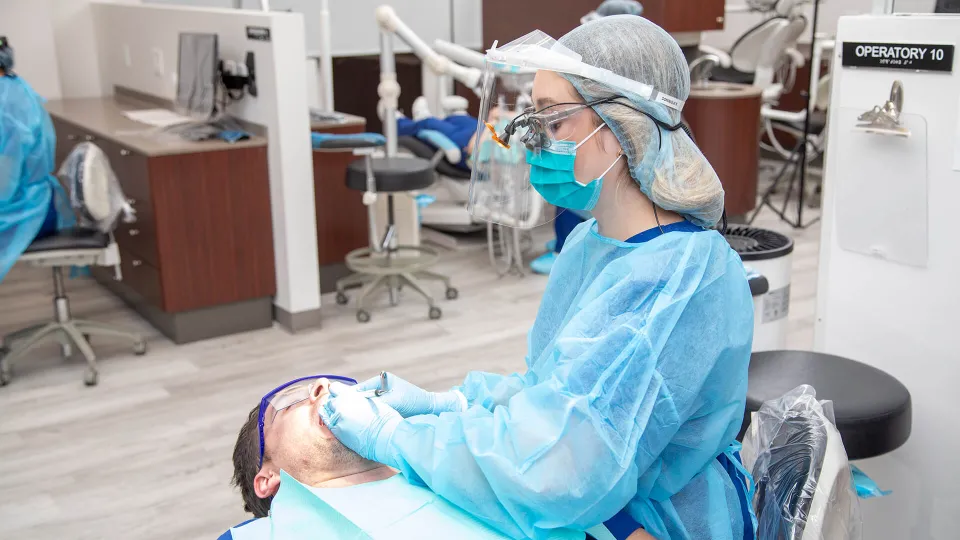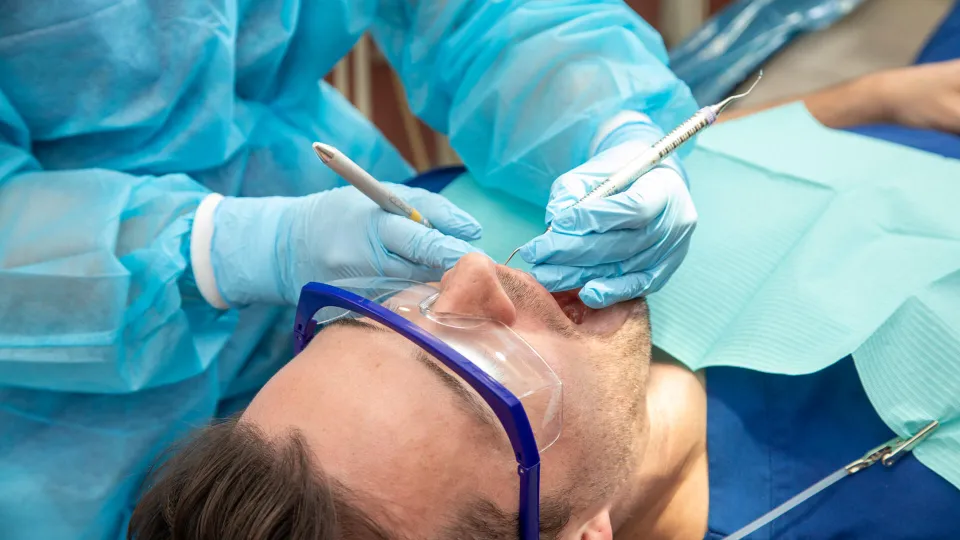
When you visit the dentist, you probably spend most of your time with the dental hygienist who cleans your teeth, takes X-rays, and provides personalized advice on brushing and flossing. If you're considering a career in the oral health sector, you may wonder what it takes to be a dental hygienist. Learn what dental hygienists do, where they work, why this career may be right for you, and what kind of education and training you may need.
What Do Dental Hygienists Do?
Dental hygienists, sometimes known as oral hygienists, are licensed health care professionals who help patients maintain their oral health and treat dental diseases. Working under dentists, they provide preventive, educational, and diagnostic services.
A dental hygienist's role can vary, but their job duties usually include:
- Performing oral health assessments: Hygienists assess patients' teeth for potential issues, such as gum disease and cavities, and update dentists about what they find.
- Cleaning teeth: A dental hygienist uses different instruments, including hand, power, and ultrasonic tools, to remove stains, plaque, and tartar from teeth.
- Applying preventive materials: Once they finish cleaning patients' teeth, hygienists apply preventive materials, such as fluoride and sealants, for additional protection.
- Taking and interpreting dental radiographs: Dental hygienists operate X-ray machines to take pictures of patients' teeth and gums. They make sure the images are accurate so dentists can diagnose patients.
- Educating patients on oral hygiene techniques: Dental hygienists teach patients how to care for their teeth with proper oral hygiene techniques, such as brushing and flossing.
- Counseling patients on oral health: Hygienists provide personalized care, answering patients' questions and recommending ways to maintain or improve their oral health.
- Reviewing patients' dental and medical history: A dental hygienist collects information and asks questions about patients' overall well-being. This information helps them determine how medical conditions or lifestyle factors may affect their patients' oral health.
- Documenting patient care and treatment plans: Dental hygienists update patients' records to reflect their care and treatments.
- Performing cancer screenings: Dental hygienists may screen patients for oral cancer during assessments. Hygienists communicate potential problems or warning signs to dentists.
Related: A Day in the Life of a Dental Hygienist
Work Environment
Dental hygienists work in health care settings. Around 94% of all hygienists work in dental offices, according to the U.S. Bureau of Labor Statistics , Dental hygienists can also work in doctors' offices, schools, public health clinics, and long-term care facilities.
Some dental hygienists choose to specialize by working in dental offices or clinics that treat specific patients. For example, some hygienists specialize in pediatrics, working in dental clinics for children and teens. Others work in nursing homes or assisted living facilities treating elderly patients.
Dental hygienists can work part time or full time, depending on their employer. Some dentists only need hygienists to work a few days each week. In that case, hygienists may work for multiple dentists, so they get full-time hours.
When working with patients, dental hygienists must take precautions to stay safe. They wear safety glasses, masks, and gloves to protect themselves from infectious diseases transmitted through bodily fluids, including saliva and blood. They also train in methods to minimize radiation exposure during X-rays.
Education and Licensing

Dental hygienists have many responsibilities and require the right training to perform their tasks. Here are the education and licensing requirements for this profession:
Education
Dental hygienists typically need a Dental Hygiene Associate Degree. This academic program combines classroom instruction with hands-on training in dental clinics, allowing future hygienists to put their new skills into practice.
The length of the program can vary. At Concorde Career College, dental hygiene students have the opportunity to earn a Dental Hygiene Associate Degree in as few as 17 months depending on the location of the campus. The Dental Hygiene program is available at select Concorde campuses. Please check with your local campus for program availability.
Licensing
Every state requires dental hygienists to be licensed, according to the American Dental Hygienists Association. Licensing requirements can vary by state, but most require students to graduate from a program accredited by the Commission on Dental Accreditation (CODA). Other requirements usually include completing the National Board Dental Hygiene Examination, as well as a regional or state board exam.
Once licensed, dental hygienists can begin working. As they continue in their careers, they need to complete continuing education to keep their licenses active.
Related: How To Become a Dental Hygienist: A Guide to Education and Licensure
Skills and Qualities
Like all health care professionals, dental hygienists use a range of skills to provide quality patient care. Some qualities they need to be successful include:
- Attention to detail: Hygienists use their attention to detail to thoroughly assess patients' teeth, mouth, and gums.
- Manual dexterity: Dental hygienists work in small spaces — the inside of people's mouths. They use their manual dexterity to perform cleanings and procedures accurately.
- Interpersonal skills: During a typical workday, dental hygienists may interact with patients of all ages and backgrounds. They use their interpersonal skills to build positive relationships with each patient.
- Communication skills: Hygienists use communication skills to educate patients about oral hygiene in clear, understandable ways. They also use these skills to discuss treatment plans with dentists.
- Critical thinking: Often, dental hygienists need to think critically as they assess patients or examine X-rays. This skill helps them interpret information and provide the best possible care.
- Empathy and patience: Some patients may feel nervous about going to the dentist. Hygienists must be empathetic and patient to make these visits less stressful.
- Physical stamina: Dental hygienists spend a lot of time on their feet and may work long days. Having good physical stamina helps them stay focused and alert throughout the day.
- Strong stomach: A hygienist can't be squeamish when exposed to saliva, blood, or other fluids. They need to have a strong stomach to deal with situations professionally.
Career Outlook
Dental hygienists have a positive career outlook, which is good news if you're considering this career. The employment of dental hygienists is projected to grow 9% by 2033, according to the BLS.
This field should grow as populations age and require additional oral health care services. More people are becoming aware of the link between oral and overall health. As this trend continues, dental offices may see a higher demand for care, which may lead them to hire more hygienists.
Advancement Opportunities

Some hygienists continue to work in dental clinics throughout their careers, while others move on to different positions. Many hygienists specialize in oral health care, such as pediatric hygiene or periodontics, which focuses on treating and preventing gum disease. By specializing, hygienists become experts in their field of oral health care.
Dental hygienists can also use their training to pursue other roles in different fields. Some common areas of advancement for hygienists include:
- Teaching.
- Research.
- Sales or marketing.
- Public health.
- Dental practice management.
- Nutrition or fitness coaching (with a focus on oral health).
Whatever your career goals in the oral health field, starting as a hygienist can give you a broad knowledge of dental care that you can take into other specializations or roles.
Related: The Different Career Paths of a Dental Hygienist
Challenges and Rewards
Choosing to pursue a career in dental hygiene is a big decision, so consider the pros and cons of this profession. The career outlook for hygienists may help you find a job after graduation. Dental hygienists can enjoy flexible schedules and meet a variety of people, often forming relationships with the patients they see regularly.
As with any job, dental hygienists face challenges in their roles. They may be exposed to bodily substances, such as blood, and they're on their feet for much of the day. Hygienists sometimes treat challenging patients, especially people who are apprehensive about visiting the dentist. As technology evolves, hygienists must stay updated on new or changing techniques.
Before you decide to enroll in a Dental Hygiene program, weigh the benefits and challenges of the role to help you make the right decision for your future.
Prepare for a Career in Dental Hygiene With Concorde
Dental hygienists have an essential role in dentists' offices, treating and educating patients on oral hygiene. It's an in-demand field with plenty of opportunities for advancement. Concorde's Dental Hygiene program can prepare you the skills and training to pursue this exciting health care career. Contact us today to learn more or schedule a campus tour.
Dental Hygienists : Occupational Outlook Handbook: : U.S. Bureau of Labor Statistics. (2019, September 4). Bls.gov. https://www.bls.gov/ooh/healthcare/dental-hygienists.htm#tab-3
Dental Hygienists : Occupational Outlook Handbook: : U.S. Bureau of Labor Statistics. (2019, December 6). Bls.gov. https://www.bls.gov/ooh/healthcare/dental-hygienists.htm#tab-4
CE Requirements by State. (n.d.). ADHA. https://www.adha.org/education-resources/maintain-your-licensure/ce-requirements-by-state/
Become a Dental Hygienist. (n.d.). ADHA. https://www.adha.org/education-resources/become-a-dental-hygienist/
Dental Hygienists : Occupational Outlook Handbook: : U.S. Bureau of Labor Statistics. (2019, September 4). Bls.gov. https://www.bls.gov/ooh/healthcare/dental-hygienists.htm#tab-6
Take The Next Step Towards a Brighter Future
Interested in learning more about our Dental Hygiene program?
We have a Concorde representative ready to talk about what matters most to you. Get answers about start dates, curriculum, financial aid, scholarships and more!







